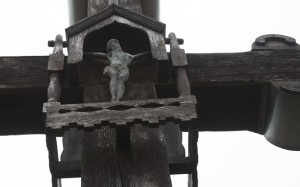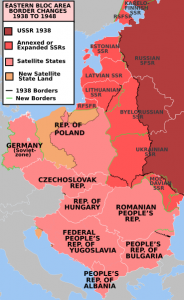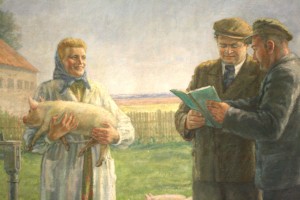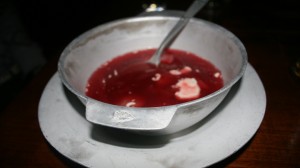Virginia steered the Honda off of the main dirt road and we entered a smaller sunken dirt road, dusty and flanked with weeds leading into a dense pine forest.
“Let’s stop and pick some wild strawberries,” Virginia suggested, scanning the fauna alongside the road and spotting strawberry leaves.

The crosses commonly seen on the side of Lithuanian country roads are a testament to the suffering the country endured in the twentieth century. Photo by Nathan Greenhalgh.
She maneuvered the Honda onto one of the banks, flanking the road and popped on the hazards. I opened the passenger side door and found myself standing face to face with a simple wooden cross nailed onto a pine tree. There was a statue of a small silver Christ on the cross. A trim wooden picket fence encircled the tree. Someone had left a bouquet of fresh pink roses inside the fence at the foot of the pine tree.
“Do you think this could be a shrine for a local partisan?” I asked.
“Possibly,” Virginia said, “you could ask.”
Virginia waded deeper into the forest and began picking strawberries. She turned and offered me her first pickings, a palm full of tiny red berries, vitamin bombs as she called them.

Blueberries, plums, billberries, currants, wild strawberries... Lithuania's forests and brushland has them all, if you take the time to look. Photo by Nathan Greenhalgh.
I picked the berries from Virginia’s palm and then offered her some of mine. Old habits do die I hard, I thought. Virginia had grown up foraging the forests for strawberries, currants, blueberries, kiškio kopūstai and other goodies. The moment she saw a berry bush or berries underfoot she dove for the bushes, hungry for the natural vitamins they provided. Today’s children no longer know the joy of foraging, the joy of discovery of a good patch of berries or herbs. Virginia had told me when she was growing up foraging in the spring and summer was a way of building up your strength after a long cold winter of eating only preserved fruits and vegetables.
When we’d had our fill, we got in the Honda and continued down the road. At the end of the road we saw the farmstead we were looking for. In the middle of expansive open fields stood a small wooden house with flecks of gray and yellow paint speckling its horizontal boards. Obviously, at one time the house had been gray-painted, then yellow-painted, but now it was simply worn by the sun, begging for a fresh coat of paint. Gray stone slabs led to the front door, which was flung open, I hoped, in expectation of our visit. An old country well stood in front of the house and a barn stood off to the side. As we pulled into the dirt driveway, a large black dog penned up to our left barked viciously while a cute small furry mutt roaming free greeted us, wagging its tail. Two women, one older and pleasant in appearance with short cropped brown curly hair and large blue eyes and the other in her late 40s stout with short brown hair, walked towards the car to greet us. It had to be Petronėlė and her daughter, Dalia, who had helped arrange the meeting.
“We’ve been expecting you,” Dalia said, greeting us and encouraging us to come inside the house. “Mama, go change your blouse,” she said, turning towards her mother. “We’ve been out weeding the garden,” she said to me, “I’m here on vacation.”
Petronėlė hurried ahead of us towards the house to obey her daughter’s command. Dalia led Virginia and I through the pretty gardens of flowers, fruits, and vegetables, narrating along the way, pausing and inviting us inside the house. We passed through a small kitchen, the front work room, and into the parlor. Here, Dalia invited us to sit down on the sofa. Then, she rushed off into the kitchen to heat us some country beet soup.
On the wall, hanging in the place of honor, was a portrait of General Jonas Žemaitis. Flanking Žemaitis on the left was a portrait of Lithuanian Grand Duke Vytautas the Great. To the right, a portrait of the Virgin Mary. On the opposite wall hung a multitude of family photos, most of them contemporary and in color, a few black-and-white. On the adjacent wall hung portraits of the family’s dead, draped in black ribbons. The corner of the room, just in front of where we were sitting, was covered over by a white masonry heater and white ceramic tiles.
Dalia came rushing back into the parlor, her arms laden with a bowl of fresh-picked cherries from the orchard, white farmer’s cheese, and plates of rye bread and homemade meats. She laid it all out on the lace tablecloth covering the coffee table.
“Let me help you,” Virginia said, leaping up from the sofa and following after Dalia into the kitchen. From the kitchen I could hear the two conversing, instant friends. It made sense, they were both about the same age and of the same experience, country girls who’d gone off to Vilnius to study and had stayed in the city.
Petronėlė came out of the bedroom adjacent to the parlor dressed in a trim light blue cotton blouse. She sat down in an armchair at the end of the coffee table, beside me, and asked, “What do you need to know? Though, it’s been so many years now, I don’t remember everything, and besides, I don’t think I was really all that important. I just did what I had to do.”
“Could you introduce yourself and tell me about your childhood,” I asked.
“My name is Petronėlė Pociūtė-Mickienė,” she began, “and my code name was Kaštonė. I was a ryšininkė, a liaison woman, for General Žemaitis for two years before I had to leave home and go into hiding. My parents were poor farmers. We had lots of land and our lives were filled with hard work. We would hire help too. This house had been new then.

The Molotov-Ribbentrop Pact and the outcome of WWII sealed the fate of Lithuania, as well as most of Eastern Europe, for half a century.
“Then the government changed in 1940. One government would come and then the next would come and that was when life changed for us on our farm. The stribai would come and make demands. The Red partisans would come and make demands. And then the green partisan period began. Our friends were partisans. Then Žemaitis came and then Bartkus came to us.”
“What do you remember about Žemaitis?” I asked.
“Oh,” Petronėlė paused and mused a moment, “Žemaitis was a gentleman. He was a handsome man. He would come in the evening and would knock on the door and then stroll inside the parlor. He’d bring in his typewriter. That was 1947. He would sit there all night long in the parlor and he would type on his typewriter. We did not dare disturb him. We were just little people. We’d offer him food and we’d stay out of his way. We got used to him and the other partisans coming to our house. My father would go out and guard the yard. My mother would make dinner. They would go on foot or my father would take them away in the cart where they needed to go.”
“Do you remember anything else about him as a person?”
“I remember that he was a wonderful person. But I was nineteen, and a shy village girl. Now, I’d have something to say to him, but then I didn’t. He had a good singing voice. I remember that. Sometimes he’d say, ‘Come girls and sing with me’ and we’d all sing together.”
“When did you start working for Žemaitis?”
“It was in 1947. Žemaitis came to me and asked me if I’d agree to work for him. He did not ask my elder sister, who was a year older than me. She was very shy and hesitant. I was bold and rather outspoken, although I was only 19. He asked me to sign a paper. I said that I agreed and I would obey. They would come here and they’d write and then they’d give me letters to deliver. I would travel six kilometers to my liaison point. I only walked at day, never at night. I knew all the trails, neighbors, the entire area. I wasn’t afraid. That was how we lived until I was betrayed.”
“Did you carry a gun when you went out with the letters?” I asked.
“Oh no!” Petronėlė exclaimed, “there was no such fashion to carry a gun then!”
Petronėlė paused a moment, then said, “Or, other liaisons would bring us letters from three kilometers in that direction,” she pointed vaguely in the direction of the window behind me that had a view to the garden. “I would deliver their letters to an older woman with the codename ‘Mama.’ I didn’t know what I was bringing. They would bring the letters here. I didn’t know everyone’s names. There was no habit of asking too many questions. It was better not to know.”
“Was your house a liaison point?” I asked.
“Dalius Žygelis from the Center for the Study of Genocide in Lithuania was here to film me. He told me that he believed that our house was one of Žemaitis’s headquarters.” Petronėlė stated this merely as a fact, not as something to brag about.
“Is that so,” I said in admiration. All the evidence seemed to indicate that this house had been used as a štabas, as headquarters.
“Did you socialize with the partisans?” I asked, remembering Leonora’s stories.
“There was no opportunity to socialize with them. It was work. I was only a postal carrier. I had to deliver letters and that was all.”
Dalia and Virginia came bustling in with bowls of hot beet soup. They set down a bowl before me. I thanked them and we continued our talk. Petronėlė resumed her story:
“Four units would come to our house. They were all gentlemen. My father would help them. My mother would feed them. One time they were here and the dog started to bark. They were all together in that room right there,” Petronėlė said, pointing to the room she’d emerged from earlier with her fresh blouse.
Caught by the NKVD
“I went to open the door. I saw the boss of the stribai right there and an entire yard full of soldiers over his shoulder. I slammed the door in his face. Then I ran into the other room and told the partisans that the entire yard was full of soldiers. The partisans opened the window and one by one jumped out and ran for the fields. They shot one just in our yard. He had been a schoolteacher. When I was finally able to come home in 1960 the first thing I did was to build him a shrine in the place where he was killed. I will show you later.”
Petronėlė paused to collect her thoughts and then continued her story:
“The boss didn’t like that I’d slammed the door in his face. They arrested me and my sister. They held us in the prison in Viduklė for three days. They questioned us. They would ask me: ‘Do you have relatives in America? Did anyone from your family go to America?’ You were the worst enemy to them if you had relatives in America. The stribai went to my father and told him they’d release us if he paid them five geese, three sheep, and 3,000 rubles. We didn’t have that kind of money. We told them it was the first time the partisans had came to us. My father went around and borrowed the money from a neighbor named Butkus and we paid them and thank God they didn’t send us to Siberia. They couldn’t get away with sending us to Siberia because we were poor farmers. My brother Jonas was taken into the Red Army. For that reason they didn’t deport us to Siberia when they took other people from our village away. In the meantime, the Russians came and took everything, even the flour, the lard, everything.”
“Eat, eat,” Dalia encouraged me, “your soup will grow cold.”
I took a spoonful of the beat soup. It was delicious, vibrant and full of flavor.
“Our neighbor over there,” Petronėlė said, now pointing out the window at the end of the parlor, “had a radio. My father would go there and together they would listen to the news from abroad. The radio would say that the Americans were coming and that all we had to do was to hold on until the Americans could get there. But I didn’t believe that the Americans would come and save us. I never believed it. Only, I knew that I had to help them and I did and I felt good about it. How could I not have helped? I was so sorry when they shot that partisan in our yard. They threw his corpse out on the market grounds. How sad I felt for the men. My heart could not allow me not to help when I could.”
“Did you have an admirer among the partisans?” I asked.
“Oh no, nothing like that, ever. We were all very proper with each other. It was our work, you understand. Though, I remember the neighbor across the road had an admirer among the partisans. They exchanged photos. When he was killed, they found her photo on him. They came and arrested her and sent her to Siberia for ten years. She came back and her health was broken. She soon died. All for a photograph.
In hiding
“In the fall of 1948 a partisan named Gailius came to me and said, ‘Do what you like, but I have betrayed you.’ I wasn’t about to sit around with my hands folded and wait to be arrested. My father hitched the horse and took me to Viduklė. From there I went to my cousin in Klaipėda. I hid with her for two weeks and then my twelve years of wandering began. I’ve hidden all over Lithuania. My friends changed my documents to the name Jociūtė and first they sent me to pose as a student at a tractor driver’s school. I went there and learned how to drive a tractor. That was how they did things during Stalin’s times. They really wanted women to drive the tractors. I graduated and the newspaper wanted to do a story about a girl who’d learned how to drive a tractor. They wanted a photo. They picked me. I didn’t want to let them take my picture and put it in the newspaper, but I did. Years later, when I came home, a neighbor said to me, ‘I saw your photograph in the newspaper.’ ‘No, no, that wasn’t me,’ I said. That’s how I lived. Pretending to be other people all the time. After it got hot at the tractor school, the director of the school sent me to the Vilnius region. Then I traveled to Rokiškis. Then I found a job through an advertisement as a teacher in Kėdainiai. I worked from school to school, later I taught in the Klaipėda region.
“Once I snuck home for a wedding in 1949. Someone told the NKVD. They almost caught me, but we saw them coming. I sneaked into bed with the children. The entire yard was filled with soldiers. The soldiers ransacked the house. ‘Where is she?’ they demanded, ‘We know she’s here?’ They didn’t find me. When they left, Father took me away in the horse and wagon. The NKVD would come all the time to our house searching for me — several times a week. My mother and father had no idea of my whereabouts for twelve years. My mother suffered. I had disappeared. For many years she had no idea whether I was dead or alive.
“When I got married and had a new surname and Stalin had already been dead awhile, I came home. We worked on the local collective farm. I didn’t tell my husband I had been a liaison woman. He thought he had married a school teacher. It became impossible to hide it from him because the neighbors knew and they told him.
“Now my children want to bring me to Vilnius with them. I refuse. After hiding for twelve years, I came home and I will never leave again. I don’t want to leave my home every again.”
Different perspective
“That’s right,” Dalia said, “we have to come home to Mama.”
“It’s just me and my dogs here,” Petronėlė said. “My work didn’t hurt me in the end. See how old I am!”
“The historian from the Center for the Study of Genocide called me and asked, ‘Do you get any addition to your pension?,” she continued. “I said I don’t. He encouraged me to try to ask for the stipend. He said, ‘Someone has to write a letter of recommendation. All the partisans I knew then are dead now. So I found the phone number of a partisan I did not know and I called him. I spoke to him and he said he couldn’t write the letter for me because he hadn’t known me then. That was when I decided that I was not going to go around begging for an extra few litai. It was not worth it. I don’t need their money. I can live without it. I did what I did then because I had to help. Why should I get paid for that now?”
Petronėlė paused and let those words sink in. Then she continued:

Soviet reacquisitions of farmers' produce and livestock was not as consensual as this propaganda painting suggests. Photo by Nathan Greenhalgh
“These days the slightest thing goes wrong and people run out and picket. Life was so hard back then for us, but we stuck together and helped each other out. The shops were empty. We didn’t eat. My salary was a teacher was 80 rubles a month, that was nothing. But when I heard that my parent’s cow died, I sent all the money I had to them and had nothing myself to live on for a month. But I managed. Now, people have the slightest amount less in all this wealth and abundance and they immediately fall into despair.”
Petronėlė sighed, “It was a question of timing. If they’d taken me during that wedding, everything would have been different for me. When I lay down to sleep at night I recite the words of the partisan songs to myself. I say them like a prayer. I repeat the words over and over again lying in bed. I’m all alone in this house. And I think, oh times were hard, but I felt good that I was doing something good that made a difference. I felt good about that.”
Almost unconsciously Petronėlė began reciting the words to partisan songs, saying them as though they were a magical incantation, a prayer. For a moment, she was lost within herself, speaking the words, feeling their rhythms on her tongue, savoring them. Then she paused and went quiet.
Another shrine
After a moment Petronėlė asked me in her patient, gentle voice, “Do you have any more questions for me?”
“I don’t think so,” I said, flipping through my notebook, reviewing my notes one last time.
“Then we can walk outside to the see the shrine,” she suggested.
“Wait, I do have a question,” I said. “As we were driving here we saw a shrine with a cross on a pine tree. Is that a shrine for a fallen partisan?”
Petronėlė shook her head slowly from side to side. “No,” she said, “that is a shrine for a fallen postal worker, a young man from the area. He was bringing us our pensions out here in the village. He had 1,000 litai with him. Some local people, a man and a woman, knew the time he would be coming through the pine forest on his bicycle and they lay waiting for him alongside the road. When they saw him, they jumped out and they killed him. They killed him for a thousand litai.”
“A postal worker?” I gasped.
“A postal worker,” Petronėlė repeated, “murdered for a thousand litai.”
“In Lithuania you can get killed for 20 litai,” Petronėlė’s daughter Dalia said.
We stood and walked outside into the yard, Petronėlė leading us toward the shrine, a simple wooden box with a pointed roof nailed to a maple tree. Enclosed inside the glass door there was a statuette of the Virgin Mary. In a clay vase at the base of the tree, Petronėlė had left a bouquet of white flowers for the school teacher partisan who had fallen here fifty years ago.
We paid our respects at the shrine and Virginia and I said good-bye to Petronėlė and Dalia, thanking them for their hospitality, the delicious country lunch, for their stories. As we were getting into the car, Dalia came running over with a Tupperware box filled with more fresh cherries from the orchard. “Something for you to chew on as you drive back to Vilnius.”
“Žemaitis really knew how to pick his liaison women,” Virginia said as we drove off down the dirt road, the two women still waving us good-bye from the road behind us. “He picked women who were kuklios, modest, psychologically strong, loyal, firm, moral.”
I nodded my agreement, glancing over my shoulder at the two women now disappearing in the cloud of dust the Honda was kicking up.
“Petronėlė is a natural child of nature,” Virginia added.
“Yes,” I answered, that was true. She was as simple and as complex as a pine tree among a forest of pines.
“I always knew this before,” Virginia said, meditatively, “but now it’s really come home to me. When the Russians came back in 1944 Lithuania’s most educated class fled for the West, leaving the simple country peasants behind. And when the time came, who was it who lay down their lives and defended their land? The pompous patriots with their university educations? No. It was the simple country people who became the nation’s heroes.”
We came to the place in the road where the shrine for the murdered postal worker stood. I glanced at it as we drove past. This road led to one village, Didvėjis. I wondered what Petronėlė, who had survived her missions carrying letters and packages, must have thought when she’d heart the news. Part of that pension that the man had been murdered for was hers.
“I was only a postal carrier,” Petronėlė had said.
Laima Vincė, a New York native, is a Lithuanian-American non-fiction and children’s book author, Fulbright scholar in creative writing at Vilnius University, journalist, memoirist and translator. For more information about her work, visit her website at www.laimavince.com and to order her acclaimed memoir “Lenin’s Head on a Platter” go here. Two translations she did of Lithuanian authors can be found here and here.
Disclaimer:
Views expressed in the opinion section are never those of the Baltic Reports company or the website’s editorial team as a whole, but merely those of the individual writer.













